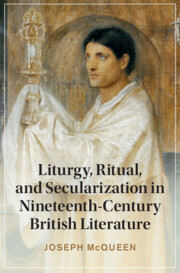Book contents
- Liturgy, Ritual, and Secularization in Nineteenth-Century British Literature
- Cambridge Studies in Nineteenth-Century Literature and Culture
- Liturgy, Ritual, and Secularization in Nineteenth-Century British Literature
- Copyright page
- Dedication
- Contents
- Figures
- Acknowledgments
- Introduction
- Chapter 1 Mediating the Modern
- Chapter 2 Memory and Revolution
- Chapter 3 Tractarian Liturgies
- Chapter 4 Realist Liturgies
- Chapter 5 Liturgical Aestheticism
- Chapter 6 Against Immanence
- Epilogue
- Notes
- Bibliography
- Index
- Cambridge Studies in Nineteenth-Century Literature and Culture
Chapter 1 - Mediating the Modern
Wordsworth’s Liturgical Subjectivity
Published online by Cambridge University Press: 14 November 2024
- Liturgy, Ritual, and Secularization in Nineteenth-Century British Literature
- Cambridge Studies in Nineteenth-Century Literature and Culture
- Liturgy, Ritual, and Secularization in Nineteenth-Century British Literature
- Copyright page
- Dedication
- Contents
- Figures
- Acknowledgments
- Introduction
- Chapter 1 Mediating the Modern
- Chapter 2 Memory and Revolution
- Chapter 3 Tractarian Liturgies
- Chapter 4 Realist Liturgies
- Chapter 5 Liturgical Aestheticism
- Chapter 6 Against Immanence
- Epilogue
- Notes
- Bibliography
- Index
- Cambridge Studies in Nineteenth-Century Literature and Culture
Summary
The liturgical forms depicted in William Wordsworth’s Excursion (1814) provide the foundational instance of the nineteenth-century resistance to excarnation and the natural/supernatural binary. Rather than naturalizing otherworldly Christian doctrines – as seminal readings of Romanticism suppose – The Excursion’s rituals disclose how material reality already participates in the divine. This participatory vision challenges voluntarist pictures of God as a large, powerful being who exercises his arbitrary will over creation – a picture of God often unwittingly adopted by modern readers. Divine participation, moreover, challenges typical readings of Wordsworth’s lyrical inwardness. For, liturgy not only draws the poem’s characters out of themselves, it also sacralizes nature. Nature’s sacredness in turn opposes the desecrating rituals – or anti-liturgies – of industrialization. Via liturgy, then, Wordsworth comments on material conditions and remains historically engaged. The Victorians will repeatedly echo this use of liturgy to sacralize material reality and to resist any forces that would violate that sacrality.
Keywords
- Type
- Chapter
- Information
- Publisher: Cambridge University PressPrint publication year: 2024

